
|
|
#1 |
|
Участник
|
stoneridgesoftware: Top 10 Posts of 2017 from the Stoneridge Software Blog
Источник: https://stoneridgesoftware.com/top-1...software-blog/
============== The Stoneridge Software team enjoys sharing Microsoft Dynamics product knowledge with end-users and information on a variety of topics through our blog posts! Thanks to our regular readers and those who are finding us for the first time. We hope you gain some knowledge that helps and inspires! Here are our 10 most popular blog posts published in 2017. 1. Working with the OData Endpoint in Dynamics 365 for Operations 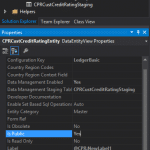 The OData endpoint is a new REST-based service that allows for integrating with Dynamics 365 for Operations. Learn more about a few tips to help with using an OData client to authenticate and use methods to read and write data in the system. 2. Five Things AX Developers Should Prepare for in Dynamics 365 for Operations What are biggest changes are for AX developers when moving from previous versions of AX to Dynamics 365 for Operations (aka AX7)? This is a great question. Here are the top five areas to look into in Dynamics 365 for Operations. 3.Batch Processing in Dynamics AX 2012 Using SysOperation Framework 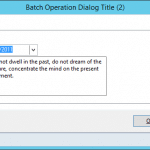 In Microsoft Dynamics AX 2012, SysOperation framework replaced RunBase framework to support the batch processing functionality. Going forward, SysOperation framework is recommended for writing custom business logic that requires batch processing functionality, over the deprecated RunBase framework. This blog post covers three different scenarios for creating batch operations using SysOperation framework classes – Service, Data Contract, Controller and UI Builder. 4. Setting Up Version Control in Dynamics 365 for Operations With Visual Studio 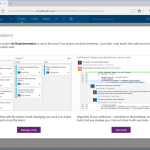 The first step to creating a new Dynamics 365 for Operations (Ax7) project is to setup Visual Studio Online (VSO). Visual Studio Online now supports Git version control, but if your solution will be deployed to a customer site, Microsoft recommends that you choose Team Foundation Version Control; at least for any projects that interface with Life Cycle Services (LCS). Additionally, learn more about creating a project in Visual Studio. 5. Dynamics AX 2012 Year-End Checklist 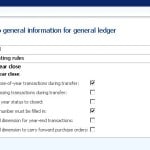 With the year at completion, it is time to think about processing a year-end close in AX. Dynamics AX has a different year-end close than most systems, as you are able to run it as many times as you need. In other systems when processing a year-end close, once you do it, there is no going back and it is difficult to make adjustments as needed. Learn more about the process and what should be on your checklist. With the year at completion, it is time to think about processing a year-end close in AX. Dynamics AX has a different year-end close than most systems, as you are able to run it as many times as you need. In other systems when processing a year-end close, once you do it, there is no going back and it is difficult to make adjustments as needed. Learn more about the process and what should be on your checklist.6. Dynamics 365 for Operations: How to Create a New Model 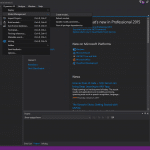 A model can be defined as a collection of elements that represent a distributed software solution. Learn more about the steps to create a new model in Visual Studio and what to consider when selecting between creating a new package or selecting an existing package. 7. Core Differences in Security Implementation between Dynamics AX and Dynamics 365 for Operations 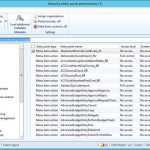 This blog focuses on core differences between Dynamics AX and Dynamics 365 for Operations security implementation and some differences in technology and methodology. 8. Sending Flat Files from Dynamics 365 for Operations to a Different Location 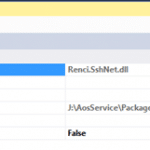 One of the challenges we have found with Dynamics 365 for Operations is the export of flat files. Recently we had to get data (as a flat file) out of Dynamics 365 for Operations and place it in a location for a separate system to process. Learn more about how to complete the process in a secure way. One of the challenges we have found with Dynamics 365 for Operations is the export of flat files. Recently we had to get data (as a flat file) out of Dynamics 365 for Operations and place it in a location for a separate system to process. Learn more about how to complete the process in a secure way.9. How to Restore Inadvertently Deleted Accounts in Dynamics 365 (CRM Modules) 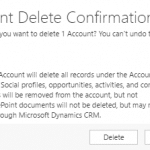 How do you restore your data if someone accidentally deletes 1000 accounts from Dynamics 365? Learn more about how to prevent the problem in the first place and what to do if it happens to you. How do you restore your data if someone accidentally deletes 1000 accounts from Dynamics 365? Learn more about how to prevent the problem in the first place and what to do if it happens to you.10. How to Import a Bank Statement File for Bank Reconciliation in Dynamics NAV 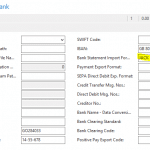 Bank Reconciliation is an important step in ensuring that your General Ledger and associated accounts are accurate, configured properly, and up-to-date. It can be tedious to manage if done manually. However, this blog will show you how to import a CSV file from the bank into Dynamics NAV for easy comparison between the bank statement and your company’s accounts. Bank Reconciliation is an important step in ensuring that your General Ledger and associated accounts are accurate, configured properly, and up-to-date. It can be tedious to manage if done manually. However, this blog will show you how to import a CSV file from the bank into Dynamics NAV for easy comparison between the bank statement and your company’s accounts.Источник: https://stoneridgesoftware.com/top-1...software-blog/
__________________
Расскажите о новых и интересных блогах по Microsoft Dynamics, напишите личное сообщение администратору. |
|
|
|
|
 Похожие темы
Похожие темы
|
||||
| Тема | Ответов | |||
| survivingcrm: Postcards from Microsoft Ignite 2017, part 1 | 0 | |||
| wiki.dynamicsbook: Changes Made in Navision Attain 3.60 | 0 | |||
|